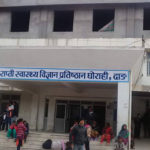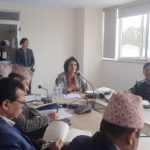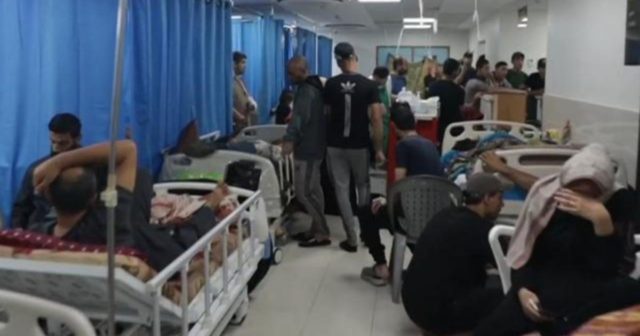National Cross-Generational Strategy to Combat HPV and Cervical Cancer in Nepal: A Collaborative Effort for Lasting Impact

In a landmark initiative to reduce the risks of Human Papillomavirus (HPV) infection and cervical cancer, Nepal has introduced a comprehensive national strategy aimed at integrating both vaccination and screening across generations. Supported by Henry Ford Health’s Global Health Initiative (USA) and implemented by the GTA Foundation in collaboration with Nepal’s Family Welfare Division, the program focuses on vaccinating young girls while simultaneously encouraging cervical cancer screenings for their mothers, aunts, grandmothers, and other women within their communities. This innovative approach is taking place in the districts of Dhading, Bhaktapur, Kavre, and Sindhupalchowk and is currently ongoing, with promising results in terms of engagement and awareness.
The cross-generational model of this program seeks to empower both younger and older generations with the tools necessary to prevent HPV infection and detect cervical cancer early. It combines education, awareness, and healthcare interventions to promote health across the community, fostering a culture of prevention and care. This effort not only targets the immediate risks of HPV but also aims to address broader public health concerns in Nepal, which has seen a rising burden of cervical cancer in recent years.
A National Collaboration: Government and International Partners Unite
This initiative is not just the work of non-governmental organizations and international health bodies; it also involves the active support of the Government of Nepal, particularly through the Family Welfare Division. The government has recently undertaken its own school-based approach to HPV vaccination, which complements the broader efforts of this cross-generational strategy. Recognizing the critical need to tackle cervical cancer at an early stage, the government has started rolling out the HPV vaccination program in schools across Nepal, focusing primarily on girls aged 9 to 14.
This school-based approach is part of Nepal’s ongoing efforts to ensure that young girls receive the HPV vaccine, which has been proven to be highly effective in preventing the majority of HPV-related cervical cancers. The initiative aligns with global recommendations and reflects Nepal’s commitment to improving women’s health at all stages of life. By offering the vaccine in schools, the government has made access to life-saving vaccines more convenient for students and their families, thereby helping to build a healthier future for the next generation of women in Nepal.
Five-Phase Approach to HPV Prevention and Cervical Cancer Screening
The cross-generational strategy follows a meticulous five-phase approach, which combines both qualitative and quantitative methodologies to ensure the program’s effectiveness and sustainability. This implementation science approach is designed to not only raise awareness but also address barriers to access and care.
- Assessment: The first phase involved extensive data collection through surveys and interviews with 404 healthcare workers, 483 mothers, and 479 girls (ages 9 to 14). This phase provided critical insights into the existing knowledge, attitudes, and practices related to HPV and cervical cancer prevention. Identifying local barriers, misconceptions, and gaps in knowledge helped tailor the subsequent phases of the program.
- Development: Based on the findings from the assessment, the next phase focused on developing training materials for healthcare providers and mobilization strategies for the community. It was essential to ensure that healthcare workers and community leaders were equipped with the right knowledge and resources to effectively promote HPV vaccination and cervical cancer screening.
- Implementation: Healthcare provider training and community mobilization interventions were started. This included organizing workshops and sessions to educate healthcare workers, Female Community Health Volunteers (FCHVs), and local mother’s groups on the importance of HPV vaccination and regular cervical cancer screenings.
- Evaluation: To measure the success of the interventions, the program uses baseline and post-intervention surveys to evaluate changes in knowledge, attitudes, and practices regarding HPV and cervical cancer prevention. These evaluations will allow program organizers to refine strategies and enhance future efforts.
- Dissemination: After collecting and analyzing data, findings are shared with key stakeholders through dissemination workshops. These sessions aim to gather feedback from participants, healthcare providers, and local community leaders, creating an ongoing dialogue about how to improve the program and ensure its sustainability.
Education and Training: A Key to Empowering Communities
A key component of this strategy has been the training and education of healthcare professionals and community leaders. The Training of Trainers (TOT) program, held in Bhaktapur and Sindhupalchowk, saw the participation of 22 nurses who were trained to lead HPV prevention and cervical cancer awareness initiatives. These nurses then went on to train 185 FCHVs, 160 healthcare workers, and 31 members of local mother’s groups, significantly expanding the program’s reach within the community.
To complement the training efforts, over 4,000 copies of HPV Awareness Educational Flyers have been distributed across the intervention districts. These flyers, tailored for teachers, students, and parents, have helped amplify awareness about the importance of the HPV vaccine and cervical cancer screening. With the distribution of 800 copies to teachers, 1,600 to students, and 1,600 to parents, the project is ensuring that critical health information reaches a broad audience.
Ongoing Surveys to Measure Impact
As part of the ongoing effort to evaluate the effectiveness of the program, a survey of 1,300 participants is planned. This survey will assess HPV vaccine awareness and cervical cancer screening knowledge after exposure to the training and awareness activities. By collecting this data, the program aims to gauge the level of awareness and determine the effectiveness of the awareness campaigns and educational efforts.
Sustainable Health for the Future
The long-term impact of this cross-generational strategy is expected to be far-reaching. By focusing on both vaccination and early detection, the program offers a dual approach to tackling cervical cancer in Nepal. In addition to empowering young girls to prevent HPV infection through vaccination, the program ensures that older women, who are at greater risk of cervical cancer, have access to timely screenings.
This initiative also aligns with Nepal’s broader goals for improving women’s health and fighting cervical cancer, a disease that has a high mortality rate in low-resource settings like Nepal. The collaboration between the government, international organizations, and local communities ensures that the program will have a lasting effect on the health and well-being of women in Nepal, setting an example for other countries in the region.
As the project continues to unfold, the partnership between the GTA Foundation, Henry Ford Health Global Health Initiative, and the Family Welfare Division provides a robust framework for addressing the challenges of HPV and cervical cancer prevention in Nepal. With sustained efforts, this initiative is poised to make a transformative impact, offering hope for a future free from the devastating consequences of cervical cancer.
#Parajuli is a Program Officer at GTA Foundation and AI-Sarosh Secretariat.
सम्पर्क इमेल : [email protected]























